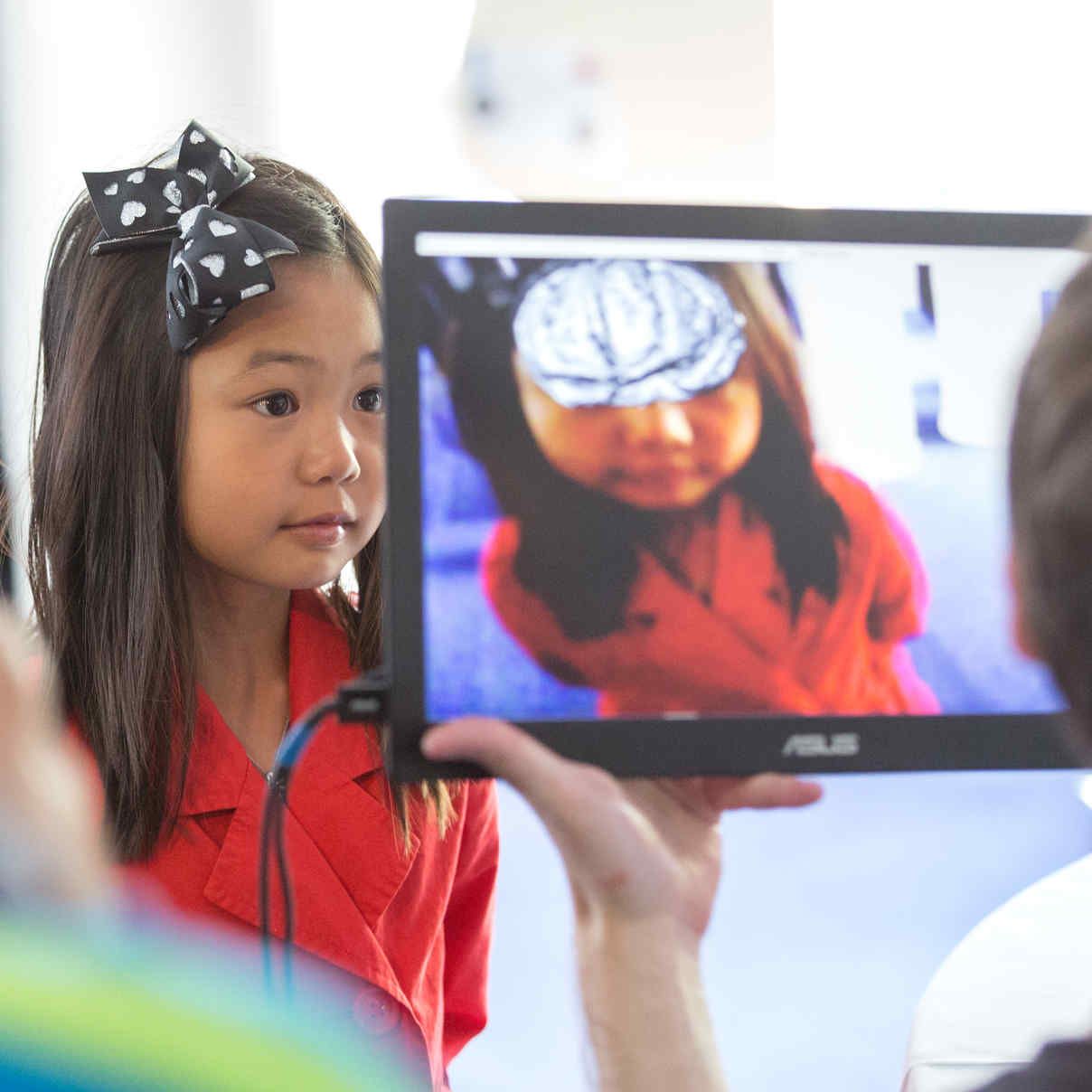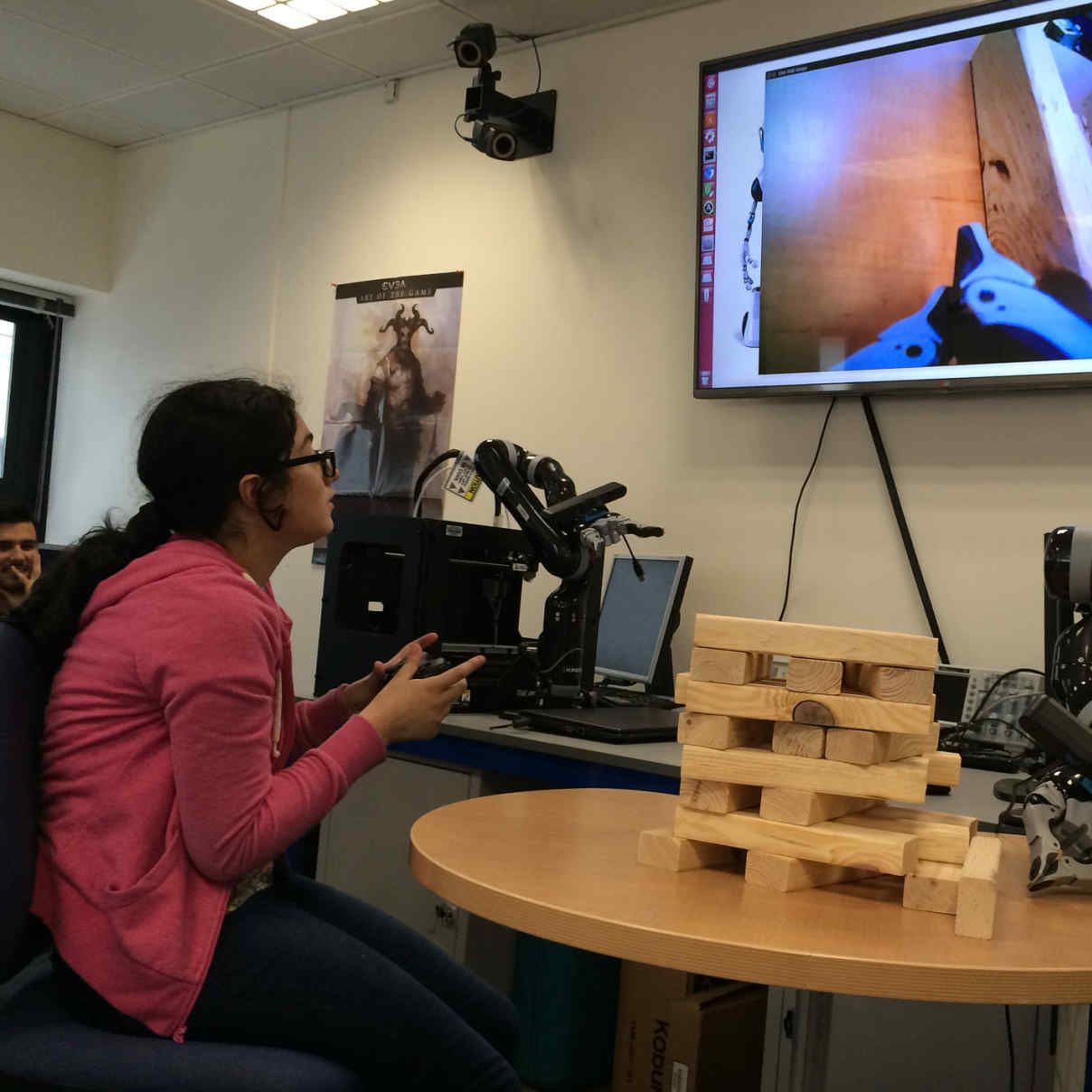Women make up only 16% of the UK’s technology workforce and only 10% of the UK’s engineering workforce. Despite the inclusion of computing as a foundation subject in the national curriculum since 2014, girls are still not engaging with computer science beyond Key Stage 3 at the same level as their male peers. This is something we want to change.
The Department of Computing actively supports opportunities for women and minority groups to engage with computing and engineering. In addition to our initiatives to support women's progression within higher education, we have created a number of outreach and engagement activities to inspire girls and women with science and technology.
Hello World Hack - Junior Hackathon for Girls
Imperial's Computing and Mathematics Departments run an annual one-day hackathon (Hello World Hack) to inspire school-aged girls with engineering and mathematical sciences. The activities - from programming robots, to designing apps that solve real-world problems - are led and supported by scientists and mathematicians who identify as women, exposing girls aged 7-10 years old to positive female role models in STEM.

Project Aims:
- Introduce computer science to children, particularly girls, at a young age.
- Encourage more young women to pursue STEM subjects and ultimately STEM careers.
- Show school students the variety of things they can achieve by learning to code and the range of career options open to them within both maths and computer science.
- Build and develop relationships and collaborations with local schools (particularly those who are underperforming, have high proportions of students entitled to free school meals or have very little or no computing provision).
- Showcase Imperial College London as not only a place of high-calibre research and innovation but also a place that is accessible and welcoming to people of all backgrounds.
Find out more about last year's event
"The girls spoke at length all the way back to school and the following day about the trip. This was a very different experience for them and the exposure to STEM activities was much needed. The day ... has the girls yearning for more STEM activities, so it is already having a positive influence and impact.”
“children absolutely loved the experience. Some said it was the best day ever!”
"All our girls from Y3, Y4 and Y5 who attended the event had an incredibly positive experience with some being exposed to coding for the very first time. They have since shared with peers how interesting and enjoyable they found the day and this has had a positive impact on the attendees and others. It was a pleasure and an honour to see the groups of girls from our schools and other schools make so much progress throughout the day whilst having an "awesome time" as it was described to me."
To register your interest in the Summer 2024 Hello World Hack please complete this short expression of interest form. Schools with a high proportion of students entitled to free school meals or with very little or no computing provision are strongly encouraged to apply.
The Frances Bardsley "Watch the Skies!" MegaGame - 2018
Teaching Fellows and Alumni from Imperial College London ran a MegaGame event at The Frances Bardsley Academy For Girls to support their Gifted and Talented students.
 This MegaGame is inspired by the classic computer game 'UFO Enemy Unknown' and the more recent excellent XCOM game. Both games, whilst very absorbing at the tactical level are naturally thin on high level politics and diplomatic action. The purpose of this MegaGame is to explore some of the bigger issues facing a world under covert (or even overt) attack by an alien menace.
This MegaGame is inspired by the classic computer game 'UFO Enemy Unknown' and the more recent excellent XCOM game. Both games, whilst very absorbing at the tactical level are naturally thin on high level politics and diplomatic action. The purpose of this MegaGame is to explore some of the bigger issues facing a world under covert (or even overt) attack by an alien menace.
The basic premise is that aliens from outer space are increasingly visiting earth to abduct, investigate, and terrorise. What is less  clear are their motives. Are they ultimately aiming to subvert and take over, or perhaps render earth demoralised and weak enough to invade, or is it some unfathomable motive comprehensible only to a twisted alien psychology? The truth is out there, somewhere.
clear are their motives. Are they ultimately aiming to subvert and take over, or perhaps render earth demoralised and weak enough to invade, or is it some unfathomable motive comprehensible only to a twisted alien psychology? The truth is out there, somewhere.
The main part of the game is about how humanity as a collection of political entities decides to react to the current emerging crisis, alongside evolving global or regional crises that characterise our day to day world. Players will therefore have more than just space aliens to deal with – they will be responding to humanity as well.
Girls aged 14 to 15 spend a day taking on a role within a team, each representing a country of the world, trying to guide their country safely through a number of crisis events whilst dealing with public opinion of their actions. The roles for each country are:
- Head of State: leads and coordinates the team and control the country’s Special Agents.
- Foreign Minister: the focal point for communication with other teams and represents the country at UN Security Council meetings.
- Chief of Defence: responsible for the deployment and actions of all military units, including the advanced units used to intercept aliens.
- Chief Scientist: collects alien technologies, decides on priorities for research and represents the country at the International Science Conference.
Engineering Summer School for Girls
The Faculty of Engineering at Imperial College London runs an Engineering Summer School for Girls to promote the breadth of engineering disciplines available to those who study science and maths subjects. This is done using a range of interactive projects and activities each led by the different Departments that make up the Engineering Faculty.
Girls aged 11 to 14 spend a week at Imperial College visiting the aeronautics, bioengineering, chemical engineering, civil engineering, computing, earth sciences and engineering, electrical and electronic engineering, materials science and engineering and mechanical engineering departments. Activities include leactures, workshops, practical activities, tours and projects.
Learn more about Imperial's Engineering Summer School for Girls, including details of how to apply

In the Department of Computing, attendees find out about the applications of computing and visit the Dyson labs where they find out how computers 'think' and have a go at playing Jenga using a robot arm. Topics in previous years have included:
- SmartDust - Prof Julie McCann
- When programs go wrong - Prof Alastair Donaldson
- Making and healing blood - Prof Ruth Misener
- Special effects - Prof Paul Kelly
- Superman X-Ray vision - Prof Ben Glocker and Dr Jiefei Ma
"I did not expect to see such modern and interesting technology [...]"
"[what I enjoyed the most was] finding out how computers can medically help humans"
Department of Computing staff and postgraduate students are also involved in the AnitaB.org initiative, with Department representatives leading the local London AnitaB.org community.
Interested in what else is going on at Imperial for women in STEM? Check out Her Imperial.
Contact
If you would like to know more about our outreach and public engagement,
email doc-outreach@imperial.ac.uk.


